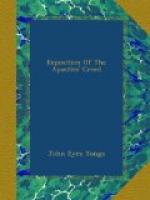(d) Another class hold the view which is termed cosmogonies than that of Moses, whether contained in the sacred books of religions that have long existed, or professing to be based on modern scientific discovery, raise difficulties that are insuperable. Whence came matter if not from the creative word of God? To assign eternity to it is to invest it with an attribute that is Divine, and Pantheists carry such an explanation to its logical conclusion when they affirm that the universe is God. The existence of a single atom is an unfathomable mystery. Man cannot create or destroy even a particle of matter. How overwhelming, then, if we reject the simple statement of the Bible, is the mystery of the great universe, in whose extended space suns, planets, stars, and systems unceasingly revolve, and in which our own world is but a little speck. All things created point to God as their origin and source. “The invisible things of him from the creation of the world are clearly seen, being understood by the things that are made, even his eternal power and Godhead."[027]
“I asked the earth,” wrote Augustine in his Confessions, “and it answered me, ‘I am not He.’ And whatsoever things are in it confirmed the same. I asked the sea and the deeps and the living creeping things, and they answered, ‘We are not thy God, seek above us.’ I asked the morning air, and the whole air with its inhabitants answered, ‘Anaximenes was deceived, we are not thy God.’ I asked the heavens, sun, moon, stars, ‘Nor,’ say they, ‘are we the God whom thou seekest.’ And I replied unto all the things which encompass the door of my flesh, ’Ye have told me of my God that ye are not He: tell me something more of Him.’ And they cried out with a loud voice, ‘He made us.’"[028]
* * * * *
ARTICLE 2
And in Jesus Christ His only Son our Lord
SECTION 1.—AND IN JESUS CHRIST
The first article of the Apostles’ Creed has numerous adherents. Jews and Christians are at one in affirming their belief in God the Father Almighty, Maker of heaven and earth. Many too who, unlike Jews and Christians, have not been favoured with a written revelation, have yet risen to the conception of such a Divine Being as that article sets forth. Mohammedans believe in an Omnipotent Creator, and many thoughtful heathens have accepted and maintained the doctrine as an article of faith. It expresses a conviction reached by Plato and Aristotle, by Seneca and Epictetus, and is a truth proclaimed by Old Testament prophets and New Testament saints. No belief regarding things invisible is more generally professed.




